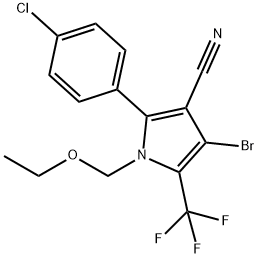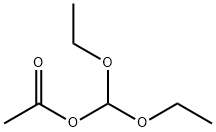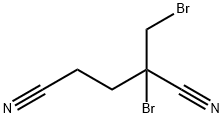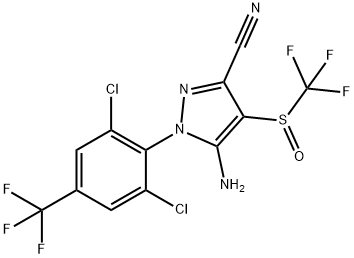Chlorfenapyr
Synonym(s):4-Bromo-2-(4-chlorophenyl)-1-(ethoxymethyl)-5-(trifluoromethyl)-1H-pyrrol-3-carbonitrile
- CAS NO.:122453-73-0
- Empirical Formula: C15H11BrClF3N2O
- Molecular Weight: 407.61
- MDL number: MFCD01631152
- SAFETY DATA SHEET (SDS)
- Update Date: 2024-12-18 14:07:02

What is Chlorfenapyr?
Description
Chlorfenapyr is a pyrrole pro-insecticide that is metabolized in vivo into CL 303268 by mixed function oxidases. Chlorfenapyr increases respiratory activity in German cockroaches when used at concentrations ranging from 1 to 10 μg per insect but has no effect on respiration in Sf9 cells when used at concentrations ranging from 1 to 100 μM and does not affect respiration in isolated rat liver mitochondria up to a concentration of 10 μM. Chlorfenapyr is active against a variety of insects including those susceptible and resistant to pyrethroid and organophosphate insecticides, including horn flies (H. irritans) as well as A. culicifacies and A. stephensi mosquitos that carry malaria (LC50s = 2-2.39% suspension impregnated on paper). Chlorfenapyr is lethal to rats with LD50 values of 441 and 1,152 mg/kg for male and female rats, respectively. Formulations containing chlorfenapyr have been used to control termites and in agriculture to control various insects.
Chemical properties
Off-White Solid
The Uses of Chlorfenapyr
Chlorfenapyr is a halogenated pyrrole based pro-insecticide. Chlorfenapyr functions by metabolizing into an active insecticide after entering the host. Chlorfenapyr is used primarily as a means of pes t control on cotton.
The Uses of Chlorfenapyr
Insecticide. Acaricide.
Definition
ChEBI: Chlorfenapyr is a member of the class of pyrroles that is 4-bromo-1H-pyrrole-3-carbonitrile which is substituted at positions 1, 2 and 5 by ethoxymethyl, p-chlorophenyl and trifluoromethyl groups, respectively. A proinsecticide used for termite control and crop protection against several insects and mite pests. It has a role as a proinsecticide and a proacaricide. It is an organofluorine acaricide, an organochlorine acaricide, an organochlorine insecticide, an organofluorine insecticide, a member of monochlorobenzenes, a nitrile, a member of pyrroles and a hemiaminal ether. It is functionally related to a tralopyril.
Hazard
A poison by ingestion. Moderately toxic by inhalation.
Agricultural Uses
Acaracide, Insecticide, Miticide: Severely Restricted for use in EU. Active in U.S. as a foliar spray in greenhouses for ornamental crops and target pests including mites, caterpillar pests, thrips, and fungus gnats. No food use in U.S. Used on ornamental crops in commercial greenhouses to control mites, caterpillar pests, thrips and fungus gnats. Not for food use. Not an approved substance in EU countries. Registered for use in the U.S.
Trade name
AC 303630®; CL 303630®; PHANTOM®; PIRATE® 3 F; PYLON®; SUMILARV® chlorfenapyr Chemical class: Pyrrole (Pyrazole); Organofluorine
Properties of Chlorfenapyr
| Melting point: | 91-92° |
| Boiling point: | 443.5±45.0 °C(Predicted) |
| Density | 1.53±0.1 g/cm3(Predicted) |
| storage temp. | Sealed in dry,2-8°C |
| Water Solubility | Insoluble in water |
| solubility | DMSO: 250 mg/mL (613.33 mM) |
| form | neat |
| pka | -18.00±0.70(Predicted) |
| form | Solid |
| color | White to Almost white |
| BRN | 6940152 |
| InChI | InChI=1S/C15H11BrClF3N2O/c1-2-23-8-22-13(9-3-5-10(17)6-4-9)11(7-21)12(16)14(22)15(18,19)20/h3-6H,2,8H2,1H3 |
| CAS DataBase Reference | 122453-73-0(CAS DataBase Reference) |
| NIST Chemistry Reference | Chlorfenapyr(122453-73-0) |
| EPA Substance Registry System | Chlorfenapyr (122453-73-0) |
Safety information for Chlorfenapyr
| Signal word | Danger |
| Pictogram(s) |
 Skull and Crossbones Acute Toxicity GHS06  Environment GHS09 |
| GHS Hazard Statements |
H302:Acute toxicity,oral H331:Acute toxicity,inhalation H410:Hazardous to the aquatic environment, long-term hazard |
| Precautionary Statement Codes |
P261:Avoid breathing dust/fume/gas/mist/vapours/spray. P264:Wash hands thoroughly after handling. P264:Wash skin thouroughly after handling. P270:Do not eat, drink or smoke when using this product. P273:Avoid release to the environment. P301+P312:IF SWALLOWED: call a POISON CENTER or doctor/physician IF you feel unwell. |
Computed Descriptors for Chlorfenapyr
| InChIKey | CWFOCCVIPCEQCK-UHFFFAOYSA-N |
| SMILES | N1(COCC)C(C(F)(F)F)=C(Br)C(C#N)=C1C1=CC=C(Cl)C=C1 |
New Products
(S)-3-Aminobutanenitrile hydrochloride 4-Methylphenylacetic acid N-Boc-D-alaninol N-BOC-D/L-ALANINOL Tert-butyl bis(2-chloroethyl)carbamate 3-Morpholino-1-(4-nitrophenyl)-5,6-dihydropyridin- 2(1H)-one Furan-2,5-Dicarboxylic Acid Tropic acid 1-Bromo-3,5-Di-Tert-Butylbenzene S-2-CHLORO PROPIONIC ACID ETHYL ISOCYANOACETATE 2-Bromo-1,3-Bis(Dimethylamino)Trimethinium Hexafluorophosphate 4-IODO BENZOIC ACID 3-NITRO-2-METHYL ANILINE 1-(2,4-DICHLOROPHENYL) ETHANAMINE (2-Hydroxyphenyl)acetonitrile 4-Bromopyrazole 2-(Cyanocyclohexyl)acetic acid 4-methoxy-3,5-dinitropyridine 1-(4-(aminomethyl)benzyl)urea hydrochloride 2-aminopropyl benzoate hydrochloride diethyl 2-(2-((tertbutoxycarbonyl)amino) ethyl)malonate tert-butyl 4- (ureidomethyl)benzylcarbamate Ethyl-2-chloro((4-methoxyphenyl)hydrazono)acetateRelated products of tetrahydrofuran








You may like
-
 Chlorfenapyr CAS 122453-73-0View Details
Chlorfenapyr CAS 122453-73-0View Details
122453-73-0 -
 Chlorfenapyr 95% CAS 122453-73-0View Details
Chlorfenapyr 95% CAS 122453-73-0View Details
122453-73-0 -
 Chlorfenapyr 98% (HPLC) CAS 122453-73-0View Details
Chlorfenapyr 98% (HPLC) CAS 122453-73-0View Details
122453-73-0 -
 Chlorfenapyr CAS 122453-73-0View Details
Chlorfenapyr CAS 122453-73-0View Details
122453-73-0 -
 1975-50-4 98%View Details
1975-50-4 98%View Details
1975-50-4 -
 2-HYDROXY BENZYL ALCOHOL 98%View Details
2-HYDROXY BENZYL ALCOHOL 98%View Details
90-01-7 -
 14714-50-2 (2-Hydroxyphenyl)acetonitrile 98+View Details
14714-50-2 (2-Hydroxyphenyl)acetonitrile 98+View Details
14714-50-2 -
 118753-70-1 98+View Details
118753-70-1 98+View Details
118753-70-1